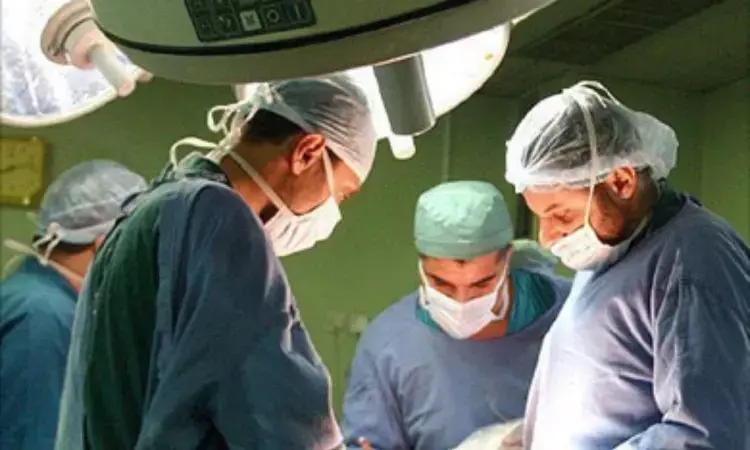- Home
- Medical news & Guidelines
- Anesthesiology
- Cardiology and CTVS
- Critical Care
- Dentistry
- Dermatology
- Diabetes and Endocrinology
- ENT
- Gastroenterology
- Medicine
- Nephrology
- Neurology
- Obstretics-Gynaecology
- Oncology
- Ophthalmology
- Orthopaedics
- Pediatrics-Neonatology
- Psychiatry
- Pulmonology
- Radiology
- Surgery
- Urology
- Laboratory Medicine
- Diet
- Nursing
- Paramedical
- Physiotherapy
- Health news
- Fact Check
- Bone Health Fact Check
- Brain Health Fact Check
- Cancer Related Fact Check
- Child Care Fact Check
- Dental and oral health fact check
- Diabetes and metabolic health fact check
- Diet and Nutrition Fact Check
- Eye and ENT Care Fact Check
- Fitness fact check
- Gut health fact check
- Heart health fact check
- Kidney health fact check
- Medical education fact check
- Men's health fact check
- Respiratory fact check
- Skin and hair care fact check
- Vaccine and Immunization fact check
- Women's health fact check
- AYUSH
- State News
- Andaman and Nicobar Islands
- Andhra Pradesh
- Arunachal Pradesh
- Assam
- Bihar
- Chandigarh
- Chattisgarh
- Dadra and Nagar Haveli
- Daman and Diu
- Delhi
- Goa
- Gujarat
- Haryana
- Himachal Pradesh
- Jammu & Kashmir
- Jharkhand
- Karnataka
- Kerala
- Ladakh
- Lakshadweep
- Madhya Pradesh
- Maharashtra
- Manipur
- Meghalaya
- Mizoram
- Nagaland
- Odisha
- Puducherry
- Punjab
- Rajasthan
- Sikkim
- Tamil Nadu
- Telangana
- Tripura
- Uttar Pradesh
- Uttrakhand
- West Bengal
- Medical Education
- Industry
Type of analgesic block not related to incidence of complications after hypospadias surgery

The type of analgesic block is not associated with the risk of developing complications following primary hypospadias correction in children, according to a new study.
The study has been published in the journal Urology.
The study was conducted to examine the association between type of analgesic block and incidence of complications following primary hypospadias correction.
Data sources included MEDLINE, Embase, Web of Science and the Cochrane Library, inception-01/2021. Randomized clinical trials, cohort and case-control studies reporting original data for patients <18 years of age undergoing primary hypospadias correction with either a penile or caudal block for which outcomes (urethrocutaneous fistula or glans dehiscence) were reported. Two researchers independently extracted data and assessed quality for inclusion. The primary outcome was the incidence of complication within 1-year post-operatively based on block performed.
Results of the study are:
Ten studies (3201 patients; range: 54-983) were included. Six studies (cumulative weight 28.6%) favored penile block while 4 studies (cumulative weight 71.4%) favored caudal block. Compared to the reference group of penile blocks, caudal blocks had no significant association with development of complications following primary hypospadias correction (relative risk 1.11, 95% CI (0.88, 1.41); p=0.38). When adjusting for meatal location (distal vs. proximal) there was no significant association with the development of fistulae or glanular dehiscence following primary hypospadias correction with caudal blocks in comparison to the reference group, penile blocks for distal, (relative risk 1.46, 95%CI (0.98, 2.17); p=0.065) and proximal (relative risk 0.95, 95% CI (0.58, 1.54); p=0.823).
Thus, the type of analgesic block is not associated with the risk of developing complications following primary hypospadias correction in children. However Caudal block should be considered for these urological interventions.
Reference:
Association of analgesic block with the incidence of complications following hypospadias surgery; a meta-analysis by Adam C. Adler et al. published in the Urology.
https://www.goldjournal.net/article/S0090-4295(22)00209-6/fulltext?dgcid=raven_jbs_aip_email#%20
Dr. Shravani Dali has completed her BDS from Pravara institute of medical sciences, loni. Following which she extensively worked in the healthcare sector for 2+ years. She has been actively involved in writing blogs in field of health and wellness. Currently she is pursuing her Masters of public health-health administration from Tata institute of social sciences. She can be contacted at editorial@medicaldialogues.in.
Dr Kamal Kant Kohli-MBBS, DTCD- a chest specialist with more than 30 years of practice and a flair for writing clinical articles, Dr Kamal Kant Kohli joined Medical Dialogues as a Chief Editor of Medical News. Besides writing articles, as an editor, he proofreads and verifies all the medical content published on Medical Dialogues including those coming from journals, studies,medical conferences,guidelines etc. Email: drkohli@medicaldialogues.in. Contact no. 011-43720751


